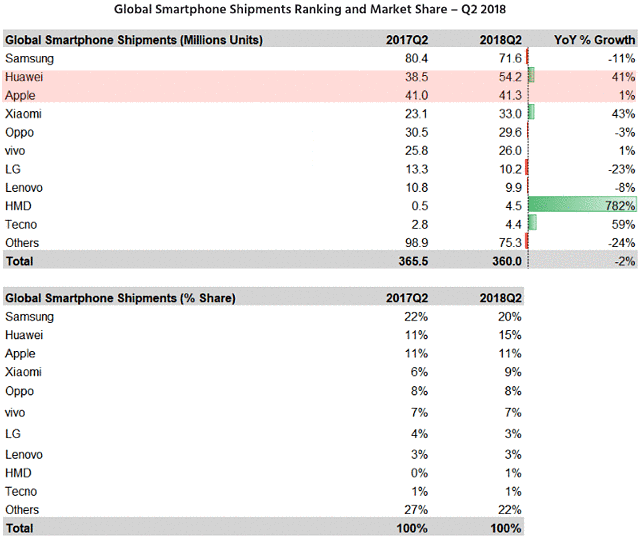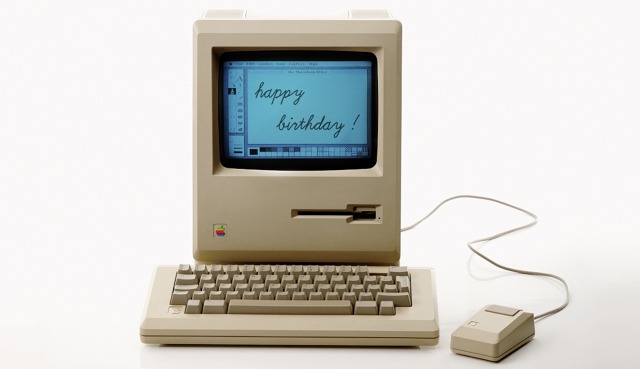Apple swells to US$1 trillion market cap despite diminishing market share

Apple has reached US$1 trillion in value despite its smartphone sales being flat over the past 12 months.
Electronics manufacturer and software company Apple (NASDAQ: AAPL) has hit a record-breaking US$1 trillion in market capitalisation – making it the world’s most valuable company and also the first company in history to reach the trillion-dollar mark.
The maker of one of the world’s leading smartphone brands – the Apple iPhone – reached a new record high of US$207.39 per share in late trade in New York on Thursday.
According to market analysts, Apple’s share price inflation may not stop there.
Apple bulls say
Despite its US$1 trillion valuation, Apple’s shares may not actually be all that expensive, considering they trade at about 15 times expected profits, compared with a figure of 82 for Amazon and 25 times for Microsoft.
Apple fans have called the achievement a sign of the company’s growing influence on consumer preferences, obtained on the back of revolutionary hardware and software development.
On the flip side, critics are claiming that Apple’s valuation is largely representative of exuberant markets that are inflated beyond their true value.
Apple bears say
Equity indices are close to all-time record highs in most developed countries including Apple’s home turf, the US. Meanwhile, the tech sector has quite literally taken the financial markets by storm, with the top five US companies all hailing from the tech sector.
The critics may have a point.
Market research has found that Huawei Technologies surged ahead of Apple in the Chinese market and seized the second spot in the global smartphone shipment rankings for the first time – clearly underlining the growth and rapid emergence of Chinese competitors.
Samsung remains the top phone manufacturer but with Apple’s sluggish growth figures, Huawei is now its top competition. Also, in the running is Beijing-based Xiaomi.

Apple’s smartphone growth has slowed to a halt over the past year.
Over the past 12 months, both Huawei and Xiaomi have recoded year-on-growth rates in global smartphone shipments of 41% and 43%, respectively. This compares to Apple’s meagre growth rate of 1% over the past year and Samsung’s 11% slide, which clearly indicates an ongoing shakeup in the global smartphone market.
The comparison is not quite fair, however – Apple makes luxury-end devices that can retail in excess of US$1,000 per smartphone, whereas Huawei serves a more price competitive, yet larger addressable market which could help explain its rapid growth.
It could just be people are turning to cheaper handsets while new mobile phone buyers are swayed by lower prices rather than cutting-edge functionality. This is likely to be the case more so in developing countries with Apple’s sales remaining more solid in developed countries such as the US and Europe.
Apple is beginning to sell fewer iPhones, but by releasing a more expensive version last year, it is making more money per device, which is keeping its margins healthy and its market valuation pushing above record highs.
Edging ahead of Apple in sales meant Huawei broke apart a seven-year duopoly in the phone market between Apple and Samsung – previously the world’s two most dominant phone manufacturers.
Trillion-dollar achievement
Reaching US$1 trillion in market cap is a pivotal moment. Apple’s value now equals that of Indonesia’s gross domestic product (US$1.05 trillion) in a year, the world’s 16th largest according to the International Monetary Fund (IMF).
The achievement comes on the back of strong share price growth in recent history, and marks another momentous occasion since the stock was first publicly traded back to 1980.
Since it was first listed as a public company, Apple stock has risen by around 50,000% with its business model changing and evolving several times over the past 40 years.
Evolution over the years
Apple traces its origins to the garage of enigmatic leader and co-founder Steve Jobs, who founded the IT company in 1976. Initially, the company was known for its alternative personal computer (PC) architecture to PCs made by the likes of IBM.
Over time, the company has evolved into making other electronic devices such as laptops, tablets as well as introducing a highly successful software business built on its software distribution platform iTunes and its Apple App store.

The original Apple Macintosh 128k released in January 1984.
To achieve its trillion-sized goal, Apple has had to diversify the sources of its sales revenues and to find plump profit margins in software.
Apple reported that it now makes around US$10 billion every three months from services such as selling apps, cloud storage and music streaming.
In 2006, Apple recorded sales of less than US$20 billion and posted profits of almost US$2 billion. Last year, its sales hit US$229 billion with profits of US$48 billion – making it not only the largest US company but also the most profitable.
